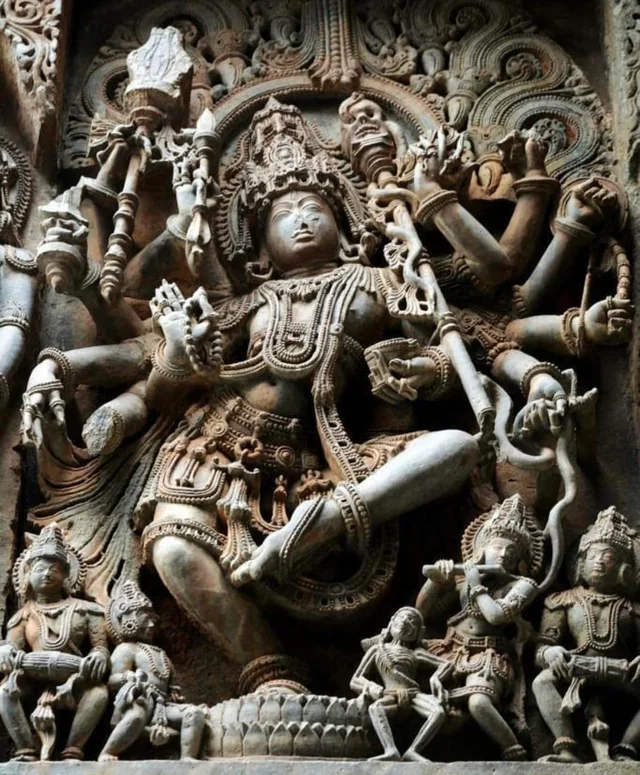
The show has ended just a few moments ago. Kaurav stands with the card given by Ishit in his hand when Siddharthada comes to inform him, “Ronida is looking for you.” “Coming,” Kaurav replies but takes a moment. He places the card in his purse. Ending the conversation, Ishit heads towards the green room. Kaurav, however, does not feel like facing Ronida just yet. He calls and says, “I’ll come after finishing up on stage.” He walks towards the stage, where the technicians have already taken down all the equipment from the fly and other areas, placing them on stage. Pintu is arranging all the props on the stage, confused as always about which item goes into which bag.
Kaurav sits on a wooden block, used as a set piece, supervising everything. After a show, this is the most important task—if even one essential item is lost, the next show will be jeopardized. He pulls out a checklist from his pocket and starts matching. Previously, this supervisory role belonged to Vismaya, while Kaurav worked under him as an executive. A strange emptiness fills him. The lines between truth and lies blur. The rumors about Pornadi and Ronida’s divorce start feeling true.
Suddenly, Pintu brings him back to reality, asking, “So, will we get the payment in Kolkata, or after the Mysore show?” Kaurav has learned from theater that for those who come from lower-middle-class backgrounds, life is much more challenging than it is for him. At least he never has to worry about food, shelter, or when his payment will arrive after a show. But the struggle for existence is not just about survival. When financial concerns fade, the fight shifts to maintaining a social identity. Theater gives him that space—to express himself. Many consider his stable financial background an advantage for his intellectual pursuits, but Kaurav feels that his privileged upbringing has distanced him from a vast section of society—something he can never bridge, no matter how much he wants to. Perhaps this very realization has mellowed his arrogance. He shakes his head at Pintu, signaling no, and finishes the packing. Annoyed, he heads for dinner. Watching everyone queue up at the buffet, he feels strangely detached.
When chaos is the norm, such orderliness seems suspicious. He watches as plates fill up with a bizarre mix of roasted chicken and idli curry. Everyone in the team is aware that Dharmaraj recommended a simple meal of greens at the end of the day. Kaurav takes only a masala dosa and chutney, avoiding the sambhar he never particularly liked. He remembers his mother. Once, she had cooked dosa, sambhar, and white chutney at Ruby’s place and brought it home for him. Though it was delicious, he had spoken against it, deriving an odd satisfaction from hurting her feelings.
Throughout this one-and-a-half-month journey, he had spoken to his grandmother once or twice over the phone but had ignored all his mother’s calls, not even calling back. The hot dosa on his plate suddenly feels cold. He glances back, lost in thought. Back then, he wasn’t a regular member of the troupe—he only joined occasionally, though “occasionally” meant quite frequently. Ronida wanted him at every rehearsal, but Pornadi scolded him, fearing it would affect his studies.
That day, they were rehearsing “Karna-Kunti Samvad,” a scene from the “Mahabharata” that they were touring across different parts of the country. Kaurav sat silently in the rehearsal room as Ronida worked on the design. Ishit played Karna, and Pornadi played Kunti. And at some point, without realizing it, Kaurav found himself slipping into the subtext of the scene. Under the glow of par, PC, and fresnel lights, what was he witnessing? “The grim outcome of war”? Or the uncertainty of life itself? That day, seeing Pornadi, he was overwhelmed with memories of his mother—the woman who played a non-biological yet crucial role in his life.
Ishit’s voice rang out, “For victory, for glory…a hero’s true path…” Sushrut held a country drum and kept playing—on and on. And when everything else fell silent, Ronida heard Kaurav, lost in thought, murmuring, “The sun sets in the evening, only to rise anew at dawn. But we can only return to lost time in our imagination, in moments of unguarded thought.”
A tear or two rolled down his cheeks. Just that much. Ronida gently remarked, “This is why you are named Kaurav!”
And then the rehearsal resumed, moving on to the next scene. Kaurav, unable to remain, had stepped outside. Since that day, he had started attending rehearsals regularly.
Now, he stares at his dosa. He no longer feels like eating. He feels nauseous. Siddharthada remarks, “It’s the coconut oil,” while Ronida attributes it to “acidity.” The rest of the troupe remains indifferent. He tells no one, but his thoughts drift to his younger brother—twelve years younger than him. He lives with their parents. His mother had named him Neer, without taking any suggestions from their grandfather this time.
Dawn has broken. Kaurav has no idea how far they have traveled or how much farther they must go. The clock reads 4:30 AM. Ishit is asleep, leaning against the window. The driver splashes water on the windshield and wipes it with the wiper. Kaurav, too, feels like splashing cold water on his face, stepping out, and standing by the bus door to feel the wind. But there’s no way to do so. Instead, his thoughts shift to an internal question—how does one reconcile with oneself?
Two years ago, after graduation, he had wanted freedom from the structured academic system—from any system, really. To put it bluntly, he had sought a fundamental moksha—one attained through inaction. Instead, he had entered a system that kneads raw human emotions like dough, molding them with both hands. At times, he thinks life would be better if he could live like a hippie. Once, he, too, had fallen in love with women. He remembers Sohini. If she had been his destiny, he would have anchored his ship in her harbor. But no such woman ever came into his life—one to whom he could surrender completely. Or perhaps he had never felt that drawn to women in the first place.
He stretches, breaking his reverie. The two Force Traveller minibuses carrying them tear through his racing thoughts as they continue further south.
After dinner, Kaurav enters Ronida’s room, where a meeting is underway with senior members of the troupe. Ronida gestures for him to sit and says,
-
The troupe is planning a theater festival in September. We all wish for your directorial debut to premiere at the festival.
-
A play I wrote?
-
No, a play you direct.
Epilogue
Five years later, let’s say, just after the Lok Sabha elections, during a manuscript discussion at Humphara Publishers, the publisher, Apurba, curiously asks Kaurav, “So, which play did you direct?”
Kaurav replies, “Dr. Faustus.”
Read All Episodes






Disclaimer
This is a work of fiction. Names, characters, places, and incidents either are the product of the author’s imagination or are used fictitiously. Any resemblance to actual events, locales, or persons, living or dead, is entirely coincidental. The views and opinions expressed in this novel are those of the characters and do not necessarily reflect the official policy or position of any agency, organization, or entity. Reader discretion is advised.


